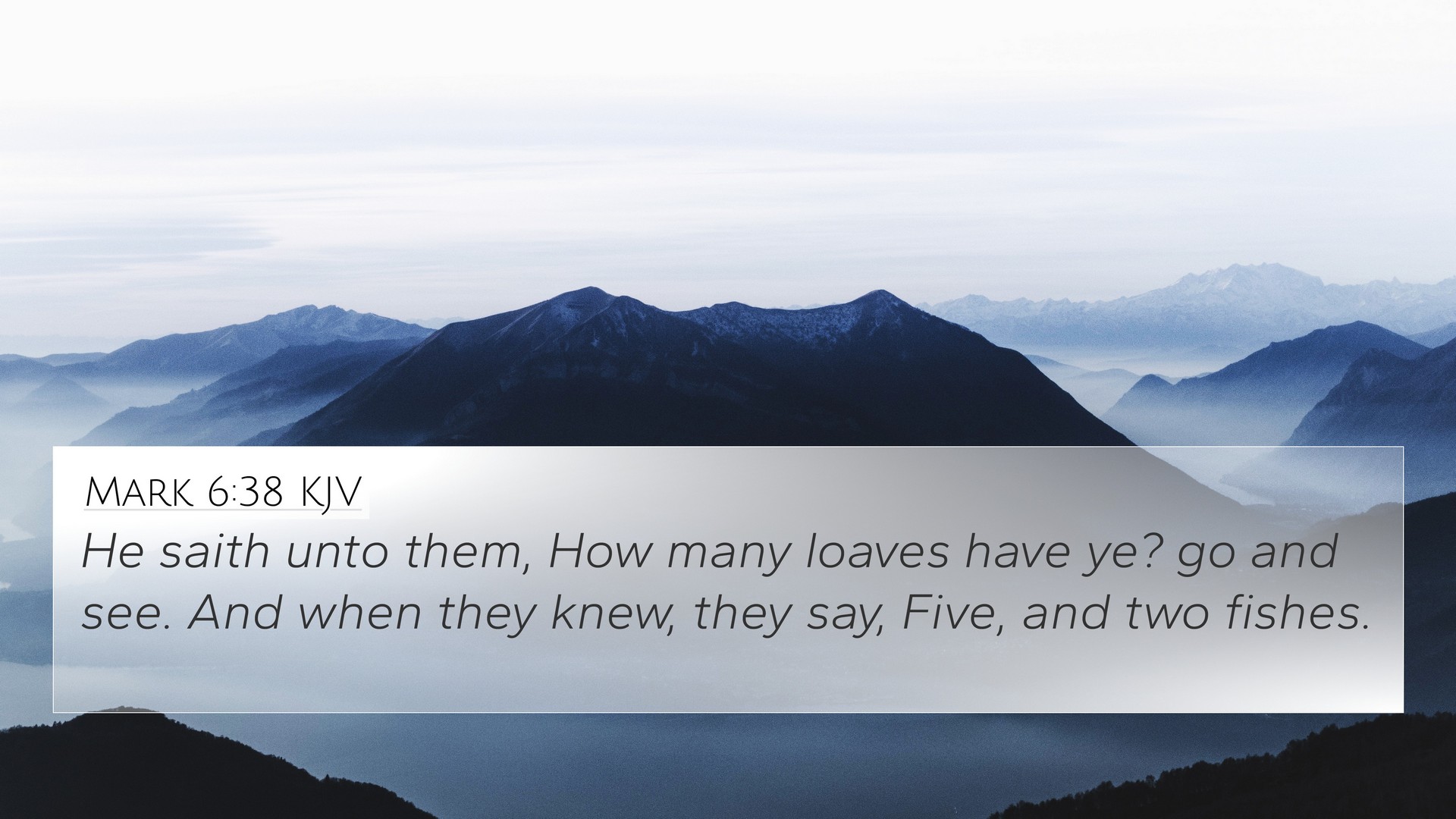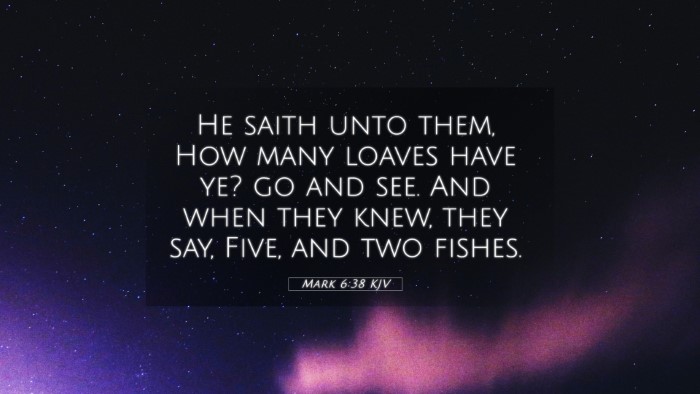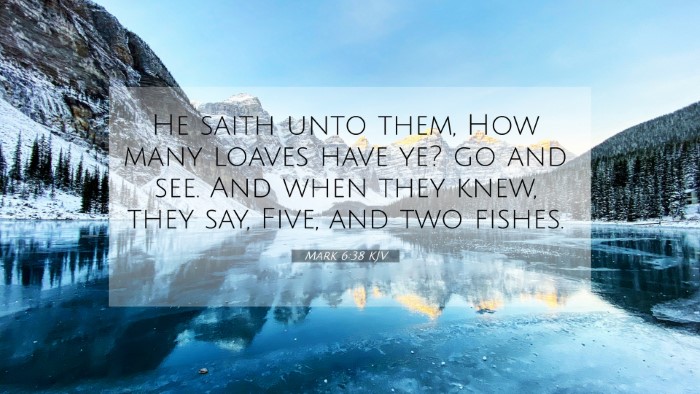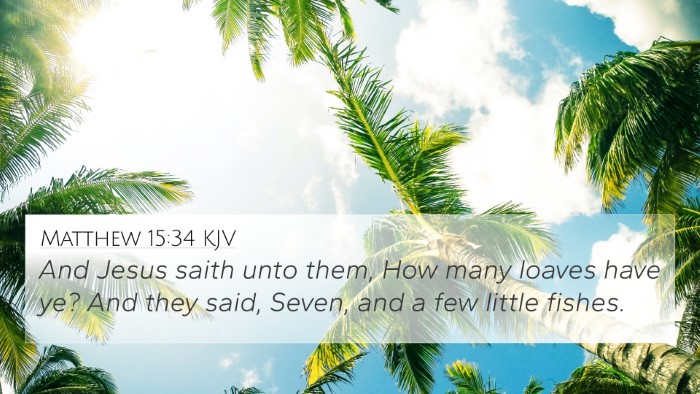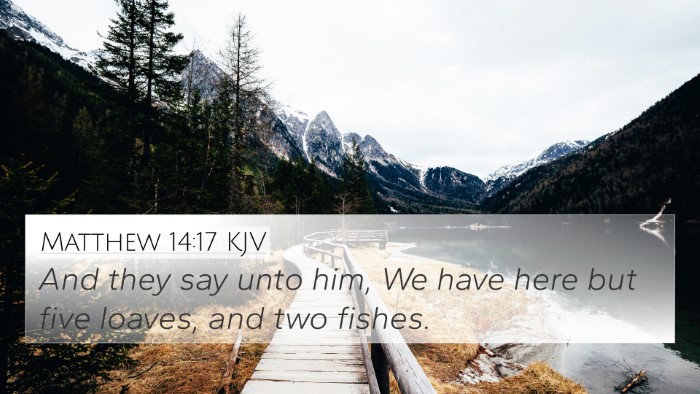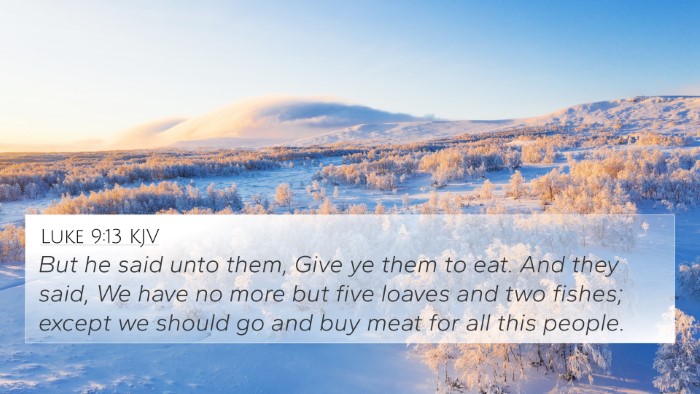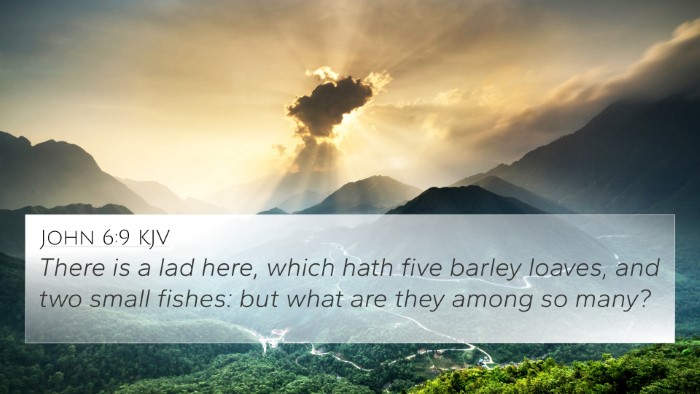Understanding Mark 6:38
Mark 6:38 states, "He said to them, 'How many loaves do you have? Go and see.' And when they had found out, they said, 'Five, and two fish.'" This verse is part of the well-known miracle of the feeding of the five thousand, where Jesus performs a miracle to feed a large crowd with a small amount of food.
Context and Background
In Mark 6, Jesus is in a deserted place with a crowd that has gathered to hear him teach. Concerned for the people's physical needs, His disciples suggest that He send the crowd away to buy food. Instead, Jesus challenges them by asking what they have to feed the people, which sets the stage for the miraculous multiplication of loaves and fish.
Interpretations from Commentators
Various public domain commentaries provide insight into the significance of this verse:
-
Matthew Henry: Henry emphasizes the importance of recognizing our own resources, however small they may seem. He points out that Jesus doesn’t ask for what they do not have but encourages them to acknowledge what they do possess. This teaches us to look beyond our limitations and trust God to multiply our offerings.
-
Albert Barnes: Barnes highlights the necessity of faith and obedience in this passage. He notes that the disciples' initial reluctance reflects a common human response to challenges - a lack of faith in God's provision. The directive to "go and see" signifies a call to action, prompting believers to explore and assess their resources before God can work through them.
-
Adam Clarke: Clarke comments on the symbolic aspect of the bread and fish. He connects the feeding to the idea of spiritual nourishment, noting that just as Jesus provided physical food, He also offers spiritual sustenance. Clarke encourages readers to see beyond the physical act of feeding the crowd to understand the deeper spiritual implications of Christ's provision.
Thematic Cross-References
Mark 6:38 shares thematic and contextual connections with several other Bible verses. These connections enhance our understanding and interpretation of this passage:
-
John 6:9: "There is a boy here who has five barley loaves and two fish, but what are they for so many?" - This verse reflects the doubt similar to that in Mark and emphasizes the significance of bringing what we have to Jesus.
-
Matthew 14:17: "They said to Him, 'We have here only five loaves and two fish.'" - This parallel account reinforces the theme of limited resources and the miracle that follows.
-
Luke 9:13: "He said to them, 'You give them something to eat.'" - This statement stresses our responsibility in the face of need and the importance of our contribution to God's work.
-
Exodus 16:15: "When the people of Israel saw it, they said to one another, 'What is it?' For they did not know what it was." - This verse from the Old Testament parallels God's miraculous provision in a time of need, connecting the themes of manna and miraculous feeding.
-
2 Kings 4:42-44: "But his servant said, 'How can I set this before a hundred men?' ... 'They shall eat and have some left over.'" - This account of Elisha's miracle mirrors the situation in Mark, illustrating God's power to provide beyond human constraints.
-
Philippians 4:19: "And my God will supply every need of yours according to his riches in glory in Christ Jesus." - This assurance speaks to God's ongoing provision for His people, correlating with the themes of trust and resourcefulness in Mark 6:38.
-
1 Corinthians 1:27: "But God chose what is foolish in the world to shame the wise..." - This verse underlines the theme of God using what appears insignificant to accomplish His purposes.
Lessons and Applications
From this verse, several lessons emerge that apply to contemporary Christian life:
-
Recognizing Our Resources: Like the disciples, we often underestimate what we have. We are encouraged to bring our 'five loaves and two fish' to Jesus, trusting that He can multiply our efforts.
-
Faith and Action: The response to Jesus’s question requires a faith-driven action. True faith often demands that we take stock of our situation and recognize God’s ability to work miracles with our offerings.
-
God's Provision: The miracle of feeding the multitude illustrates God's abundant provision. We are reminded that God is not limited by our circumstances; He is capable of providing abundantly beyond what we can imagine.
-
Involvement in God's Work: Jesus invites His disciples to participate in the miracle by distributing the food. Similarly, we are called to be active participants in God's work, using our gifts and resources to serve others.
-
Spiritual Nourishment: Beyond physical needs, this passage reminds us to seek spiritual nourishment from Christ, who satisfies our deepest hunger.
Conclusion
Mark 6:38 serves as a powerful reminder of God's capability to use our limited resources for His greater purposes. By examining this verse and its connections, believers are invited to deepen their faith and reliance on Christ's provision. Through prayerful consideration of the related verses and themes, we can better understand how to represent God's kingdom effectively in our lives.
Further Study
For those interested in a deeper exploration of cross-referencing Biblical texts, tools like a Bible concordance or a Bible cross-reference guide can be invaluable. These resources can help facilitate a cross-reference Bible study that illuminates the rich tapestry of connections throughout Scripture.
